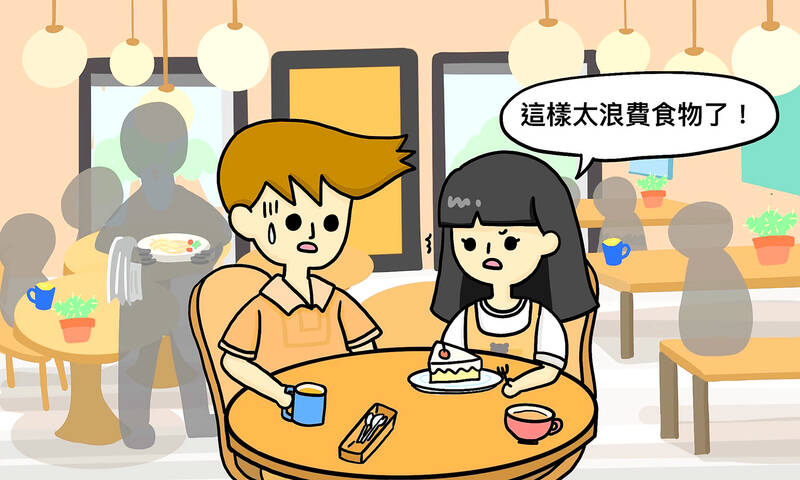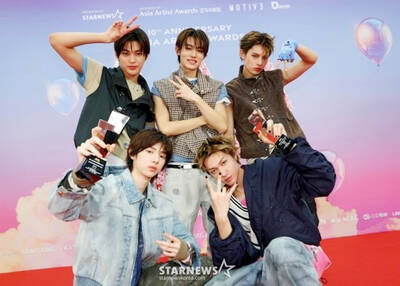對話 Dialogue
小實:馬克,你怎麼讓老闆收走了你的餐點?
Xiǎoshí: Mǎkè, nǐ zěnme ràng lǎobǎn shōu zǒu le nǐ de cāndiǎn?

馬克:因為我吃飽了。
Make: Yīnwèi wǒ chī bǎo le.
小實:吃飽了?可是你還有好多東西沒吃。
Xiǎoshí: Chī bǎo le? Kěshì nǐ háiyǒu hǎoduō dōngxi méi chī.
馬克:嗯,剛剛點餐的時候我好餓,所以一不小心就點太多了。
Make: Ēn, gānggāng diǎncān de shíhòu wǒ hǎo è, suǒyǐ yí bù xiǎoxīn jiù diǎn tài duō le.
小實:點餐以前,你應該要先想好要吃多少東西,要不然這樣太浪費食物了。
Xiǎoshí: Diǎncān yǐqián, nǐ yīnggāi yào xiān xiǎng hǎo yào chī duōshǎo dōngxi, yào bùrán zhèyàng tài làngfèi shíwù le.
馬克:會嗎?可是我都付了錢啊!
Make: Huì ma? Kěshì wǒ dōu fùle qián a!
小實:以前的臺灣人說,要是你不吃完碗裡的飯,以後的先生或太太臉上就會長滿痘痘。
Xiǎoshí: Yǐqián de Táiwān rén shuō, yàoshì nǐ bù chī wán wǎnlǐ de fàn, yǐhòu de xiānshēng huò tàitai liǎnshàng jiù huì zhǎng mǎn dòu dòu.
馬克:好啦!以後我會好好珍惜食物的。
Make: Hǎo la! Yǐhòu wǒ huì hǎohǎo zhēnxí shíwù de.
翻譯 Translation
Xiaoshi: Mark, why did you let the waiter take away your meal?
Mark: Because I’m full.
Xiaoshi: Are you full? But you still left a lot on the plate.
Mark: Well, I was so hungry when I ordered, so I may have ordered too much by accident.
Xiaoshi: Before ordering, you should think about how much you want to eat; otherwise it would be a waste of food.
Mark: Will it? But I paid for it!
Xiaoshi: There is a saying in Taiwan that if you don’t finish the rice in the bowl, your future husband or wife will have pimples on their face.
Mark: Alright! I will cherish food in the future.
單字片語 Vocabulary
1. 餐點 (cāndiǎn) meals
2. 點餐 (diǎncān) to order
3. 一不小心 (yí bù xiǎoxīn) accidentally
4. 要不然 (yào bùrán) otherwise
5. 浪費 (làngfèi) to waste
6. 食物 (shíwù) food
7. 長痘痘 (zhǎng dòu dòu) to have pimples/acne
8. 珍惜 (zhēnxí) to cherish
教材音檔 Audio Files
教材影片 Video Files:
https://www.instagram.com/celc.nou_tw/guide/_/17999106352646292/
實踐大學華語中心提供
By Shih Chien University Chinese Language Center: https://chineseusc.com/

Have you ever gazed at the night sky and felt as though the Moon loomed larger than usual? Your eyes were not deceiving you. The Moon’s apparent size can __1__ subtly depending on where it is in its orbit. On certain occasions, it reaches its fullest phase while at its closest point to Earth. When these two events __2__, scientists and the public refer to the spectacle as a “supermoon.” The Moon does not orbit our planet in a perfect circle. Instead, it travels along a more oval-shaped __3__, completing one full orbit every 27 days. Consequently, there are times when

A: South Korea’s Golden Disc Awards ceremony is taking place at the Taipei Dome on Saturday. Eighteen acts are taking to the stage, including Blackpink’s Jennie. B: The hottest boy group CORTIS is also performing. I can’t wait to see James, the Taiwanese member of the band, perform. A: Who else are playing at the K-pop show? B: This year’s lineup is stacked, including: Allday Project, ARrC, Ateez, Boynextdoor, Close Your Eyes, Enhypen, IVE, Izna, KiiiKiii, Le Sserafim, Monsta X, NCT Wish, Stray Kids, TWS, Zerobaseone and Zozazz. A: SKZ, Enhypen and Ateez dominated Billboard’s 2025 Year-End World

A: Aside from K-pop, what were the English chart-toppers? B: Billboard’s top three singles for 2025 were “Die with a Smile” by Lady Gaga/Bruno Mars, “Luther” by Kendrick Lamar/SZA and “A Bar Song (Tipsy)” by Shaboozey. Plus, pop diva Mariah Carey’s 1994 megahit “All I Want for Christmas Is You” won its 20th and 21st weeks at No. 1, becoming the longest-running No. 1 song in history, A: How about in Taiwan? The news says nine of the 10 most-streamed songs on Spotify Taiwan were Korean. B: Yup, and the top three were: “Winter Ahead” by BTS’ V and Park

AI-generated summaries are shaking up the media world. Tools like Google’s AI Overviews now provide users with direct answers above the search results, resulting in fewer people clicking on news links. For publishers who rely on that traffic to generate advertising revenue, this shift is hitting hard. The fallout is measurable. Many sites have seen a sharp drop in traffic since AI summary features rolled out. An analysis revealed that a news outlet that had once ranked first on Google lost up to 79% of its traffic when its link appeared beneath an AI-generated summary. Statistics also show that